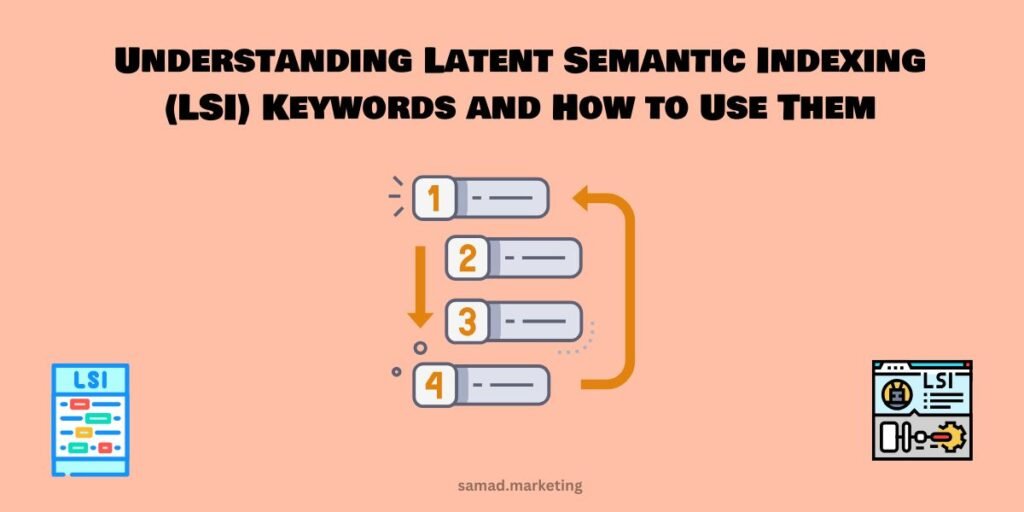If you’ve been learning SEO, you may have come across the term LSI keywords. But what are they exactly? Are they a real ranking factor? And how can they help improve your content and SEO?
In this blog post, we’ll break down LSI keywords in simple terms, explain their role in modern search engine optimization, and show you how to use related keywords effectively—even if LSI isn’t technically a Google term.
🧠 What Are LSI Keywords?
LSI stands for Latent Semantic Indexing—a method used in computer science to understand the relationship between words and concepts in a document.
In SEO, LSI keywords are often described as words or phrases related to your main keyword. These aren’t just synonyms, they’re contextually relevant terms that help search engines understand the content topic more clearly.
📘 Example:
Let’s say your main keyword is “Apple”.
Without context, search engines don’t know if you mean:
- Apple the fruit
- Apple, the tech company
- Apple, the music label
But if your content also includes words like “iPhone,” “MacBook,” or “iOS,” it becomes clear you’re talking about Apple Inc.
These related terms act like semantic clues.
📢 Do Search Engines Really Use LSI?
Not exactly.
Google has confirmed it does not use LSI as part of its algorithm, but that doesn’t mean the idea behind it is useless. While LSI itself is outdated, the principle of using semantically related keywords is essential.
Modern search engines use advanced techniques like:
- Natural Language Processing (NLP)
- BERT
- MUM (Multitask Unified Model)
These help Google understand the intent and context behind words.
So instead of chasing “LSI keywords,” focus on contextual relevance.
🔍 Why LSI-Type Keywords Are Still Important
Even if the term is outdated, including related phrases and topics in your content helps you:
- Avoid keyword stuffing while keeping the content rich.
- Rank for a wider range of search queries.
- Help Google better understand what your content is about.
- To improve your chances of appearing in featured snippets and related searches, focus on clear and relevant content.📋 How to Find LSI-Style Keywords.
Here are simple, free methods to find relevant keywords:
1. Google Autocomplete
Start typing your main keyword in the Google search bar and note the suggestions. These are based on real searches.
Example:
Type “SEO tools for” and see suggestions like:
- SEO tools for beginners
- SEO tools for small businesses
- SEO tools for YouTube
2. People Also Ask
Look at the “People Also Ask” box on Google’s search results page. These questions are closely related to your topic and can provide content angles and supporting keywords.
3. Searches Related To…
Scroll to the bottom of the Google search results. You’ll see “Related Searches,” which gives more keyword ideas.
4. Use Tools like:
- LSIGraph.com – Despite the name, it finds semantically related keywords.
- Ubersuggest
- AnswerThePublic
- SEMrush / Ahrefs – Use the “related” or “matching terms” filters.
🛠️ How to Use LSI/Related Keywords in Your Content
Here are some best practices:
1. Use Them Naturally
Don’t just insert keywords for the sake of it. Add related terms where they fit naturally within your content.
2. Include Them in Key Areas
- Headings (H2, H3)
- Meta descriptions
- Image alt text
- First 100 words of content
- Anchor text for internal links
3. Cover the Topic In-Depth
The best way to include semantically related keywords is to create comprehensive content that addresses multiple angles of the topic.
For Example, if your blog post is about “content marketing,” related topics might include:
- Content strategy
- Blogging
- Social media
- Email newsletters
- Content calendars
Google sees this as topical relevance.
4. Write for Users, Not Just Search Engines
If your content truly helps users and answers their questions in depth, you’ll naturally include related phrases and concepts.
Great SEO writing is user-first and context-rich.
🚫 What Not to Do
- Don’t stuff related terms unnaturally
- Don’t use keyword tools that recommend meaningless combinations
- Don’t confuse LSI keywords with exact-match variations (they’re not the same)
🧭 Final Thoughts
While LSI keywords may not be part of Google’s official algorithm, the concept behind them—contextual relevance—is more important than ever in 2025.
Instead of obsessing over LSI tools, focus on creating rich, meaningful content that naturally includes:
- Synonyms
- Related phrases
- Supporting topics
That’s how you help both users and search engines understand your content, rank better, and offer true value.

